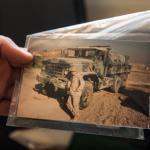Taking the Blinders Off
Veteran Christopher Tyler’s experience with CPT

SPC Christopher J. Tyler
US Army, 1996-2004
Before, I had my blinders on and I’d see all the things I had [done] wrong. And now, when I go through it, I see the experience as a whole…The way I think about this completely changed.”
Chris Tyler joined the Army in 1996, right after he graduated from high school. During his nine years of service, he was deployed to Kosovo for six months and to Iraq for 17 months.
In Iraq he was part of the 168th Military Police Battalion. He did guard tower duty. He transported fuel and ammunition. He worked the front gate of his base. But the most dangerous part of his job was prisoner transport.

My main job was to pick up prisoners from Baghdad police stations and take them to be interrogated by Special Forces at the Baghdad airport."
To get to the airport, Tyler drove “Route Irish,” known at the time as the most dangerous road in the world. “It was a little nerve-racking to work that road …constant watching of all directions. Debris on the road could be a roadside bomb. There was a lot of heavy traffic... and then, holding prisoners... in the back of your truck, you don’t really stop for anybody.”
Tyler’s vehicle frequently came under attack. One incident in particular would haunt him for years to come.
When he got back home to Michigan, Tyler knew he had changed. He had a hard time making sense of civilian life. His marriage became strained. His friendships suffered. Work was difficult. He was depressed and angry. He thought about suicide.
“I was just a shell. I was kind of drifting through life.”
Finally, eight years after leaving the military, Tyler sought help from the VA. He was diagnosed with PTSD and decided to enter a residential treatment program, where he began Cognitive Processing Therapy (CPT). In CPT, patients learn how the way they think can negatively affect the way they live, and how to recognize the thoughts that are making life difficult. Tyler would spend the course of his therapy learning how to reframe those thoughts. Though it sounds simple enough, to Tyler, it was fraught with risk.
The first week you get to write your Impact Statement — write everything down as far as what was going on with your life, here's why I'm here. It's kind of coming to terms with yourself, looking yourself in the mirror."
Christopher Tyler
Tyler carefully read through his Impact Statement, both on his own and with his therapist. The goal was to identify negative thoughts called “stuck points.“
A stuck point is a thought or belief that people with PTSD just can’t get past, and keeps them from living the way they want. It could be a thought like, “I shouldn’t have survived that attack.” Or “danger lurks around every corner.” Or “no one can be trusted.”
With the help of his therapist, Tyler would learn to recognize his own stuck points, and then learn the tools to understand and eventually defuse them.
A stuck point to me is thoughts that prevent you from being yourself. A lot of my stuck points that I had from the war carried over into my civilian life. One of my biggest ones was I didn't deserve to be happy, I didn't deserve to be loved."
Christopher Tyler
Over the course of his therapy, Tyler used a variety of written worksheets to understand how his thoughts were causing him distress. Not only did they cloud over his days, but they cast a dark shadow over his past as well. Much like his cache of military treasures, Tyler had kept his most difficult memories tucked away.
Under the guidance of his therapist, he would unpack and inspect the one thing he’d kept locked up tight: the memory of the traumatic event.
For Tyler, this moment would be pivotal.
It's like pulling the thorn out that you've been carrying the entire time. You're going to have to dig it out, but in the end, it's out. And you feel so much better."
Christopher Tyler
The tools Tyler leaned in CPT gave him a new perspective on how ingrained and rigid his thoughts had become. He became more flexible in his thinking. From this new vantage point, Tyler could see his traumatic event in a more realistic light. The dark clouds started to lift, and relief, at one time unimaginable, was in sight.
His life began to change for the better.
I could definitely see the changes in my beliefs, the changes in my thoughts, the way I viewed my life, the way I see the world and the way I see my trauma."
Christopher Tyler
When Tyler began treatment, he worried that therapy would push him over the edge – that he’d come out worse than when he went in. Instead, Cognitive Processing Therapy helped him break the cycle of his negative thinking, and re-frame his perspective on the past... and the present.
He became less suspicious of the world. He was able to engage with people, to make and keep friends. And he was able to see his military experience, even the darkest moments, in a new, more insightful way. It wasn’t easy, but Tyler came through CPT with his PTSD under control and ready to re-engage.

I thought it’d be all smoke and mirrors and you know, a dog and pony show like they call it in the military. But no it’s definitely not a dog and pony show, the stuff actually works, it’s very real.”

Want to learn more about CPT?
Check out these videos featuring VA providers and Veterans who’ve been through it.